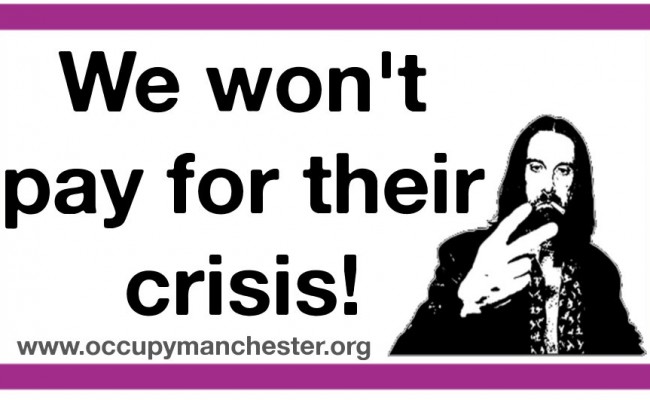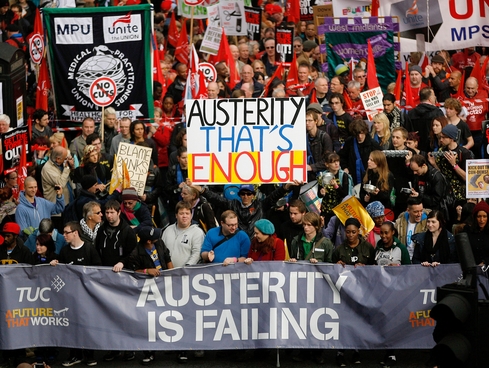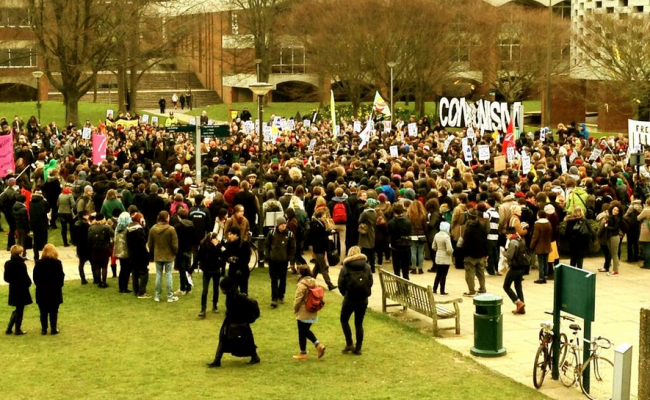Some of the members of Plan C MCR were involved with organising the very first Occupy! Manchester event which took place over a year ago during the Tory party conference in 2011. Whilst it didn’t meet all it aimed to achieve we stand by its attempts at moving beyond familiar forms of political action. For pictures from the day see here. Occupy MCR is still organising and can be found here and their twitter feed can be found here.
Who are you and what are you planning to do?
The Occupy! Manchester organising group emerged with the specific aim of mobilising against the Conservative Party Conference, due to be held in Manchester in early October. It is made up of individuals from various groups in Manchester, and formed in response to a call to mobilise for a mass protest that would aim to involve people who may not otherwise have joined together in protest on the day.
I’ll say a bit more about how the group formed, because it’s important for what we’re trying to do. After the student protests of last winter and the TUC national demonstration on 26th March, it was clear to many in Manchester that the Tory Conference would be the next major event for the anti-cuts movement (broadly defined) and that we should step up and make it one to remember! But there was also a strong feeling that the Tory Party mobilisation should be a progression from 26th March, where the various wings of the movement had acted in almost total isolation from one another (with the UK Uncut action being the only potential point of convergence between those involved in official protest and direct action). As such, neither the march called by the TUC to coincide with the Conference, nor affinity group or black bloc-style actions would be enough on their own, as these tend to reproduce the divides into which we as protesters so often allow ourselves to fall: activists and ordinary people, students and workers, public and private sector workers, benefits claimants and taxpayers, socialists and anarchists, peaceful and violent campaigners. It was from this climate that the idea for an alternative organising platform that could bridge these divides emerged.
It’s important to explain at this point that the feeling described above was one that was shared, to various degrees, across the left spectrum. It was a small group from the autonomous/anarchist tradition that called the first meeting for what would become Occupy! That group (of which I was part) was inspired by the wave of student protests that kicked off with Millbank, but also frustrated by the failure to maintain momentum following the student fee decision of 9th December, and by the narrow political vision displayed by all wings of the movement on 26th March. Meanwhile though, it was clear from one particularly well-attended and rowdy ‘open planning meeting’ for the TUC-called march of 2nd October that many union organisers were just as frustrated – they had great admiration for the militancy of the student protests and were keen to encourage more dynamic and militant action from within their ranks. From all corners, there was a recognition that only by pooling our mobilising capacities did we have any chance of organising a demonstration with the potential to start overcoming some of these issues. In response, then, a group formed, which today is made of individuals from various groups from Manchester who share this spirit of mobilising for a unified and militant protest. And eventually, after much discussion (and some compromises!), we decided that an occupation of Albert Square would be a good way to achieve the aims we’d set out for ourselves. As an extension of the commitment to a broad-based and non-sectarian mobilisation, we’ve also been encouraging groups representing a range of political persuasions, sectors etc to sign up publicly in support of the action and promote it among their members or networks. Hence the “diverse” list of supporters!
As for what we plan to do, we’re calling for an assembly of protest on the doorstep of the Conference, as a symbol of the mass and deeply-felt opposition to the coalition government’s austerity measures and the belief in better alternative futures. The choice of location was a very important one. Albert Square is very close to the ring of steel surrounding the conference centre. It therefore offers a chance not only for people to talk together politically, which is of course the connotation of ‘assembly’ and an important political principle for one of the exciting political developments of the past year: the Real Democracy movement (whose Manchester incarnation – Real Democracy Manchester – has been a key supporter of Occupy!). Rather, it was also important to us that the occupation was a place of protest. Close proximity to the conference centre is important in that respect and offers opportunities for disruptive actions to happen.
Albert Square also houses Manchester Town Hall, seat of Manchester’s Labour-led council. That’s significant politically as well, as it’ll be a reminder to everybody that this protest isn’t just about the Conservatives. This is particularly important in Manchester, which is obviously a long-time Labour stronghold, where opposition to the Conservatives is all too easily recuperated. The Occupy! organising group doesn’t have a shared political position as such (due to its broad nature, we’ve tended to concentrate on letting the form of protest itself do the talking politically). However, one important bottom-line for the group has always been a rejection of all the mainstream political parties. The more successful Occupy! is in bringing large numbers of people from diverse backgrounds together on the day, the more important it will be that we make this rejection heard on the day – something that the radical, autonomous left should be well placed to do.
Aside from all this, we don’t want to circumscribe what will happen on the day. We’re asking people to come prepared to make the occupation their own – things will be guided by those participating and the atmosphere on the day. That said, as the day approaches Occupy! will be making announcements about the timings of some specific activities that are planned to take place in or around the occupation – that way those from outside of Manchester or who can’t stay indefinitely (and we’re aware that, lamentably, the timing of the plans means that the employed among us might have to head off early) can plan a bit better. Assemblies and noise demos throughout the night (the Midlands Hotel, where many top Conference delegates will be staying, is a stone’s throw away from Albert Square: as a slogan from the Spanish occupations goes, ‘if they won’t let us dream, we won’t let them sleep!’) are ideas that are being floated at present. As I write we’ve had a group of lecturers approach us about doing a “teach out”. There’ll also be sound systems to keep us going throughout the night.
What is the relationship between Occupy! and the TUC demonstration in Manchester on the same day?
Although as individuals the Occupy! group has mixed opinions on official marches as a form of protest, as a group we have always recognised the importance of marching, on its own terms at least: the TUC national march on 26th March, for example, was successful insofar as it brought massive numbers out onto the street (its role in the ongoing disputes over pensions, meanwhile, is less clear cut). As I’ve said above, we’ve wanted to avoid the divisive narratives of good protester/bad protester (and the rest!), so we’ve made efforts to coordinate with the organisers of the main demo, to emphasise our intention to supplement rather than conflict with the main march, and to avoid, as far as is feasible, plans that will be perceived as separatist. We’re inviting marchers to join us whenever they’re ready, whether that be after the main demo or not. In this same spirit, we’re hoping that those who are interested in the march and subsequent rally recognise that not everybody feels the same!
The media and politicians will obviously have their own version of events though, so how successful we are in presenting a united front will obviously rely in large part on the solidarity we show to one another on the day. Not surprisingly, we haven’t been able to rely on the union leadership for support in this respect. On the other hand, the occupation has generally been really well received among grassroots and more radical union organisers. And it’s these grassroots, rank and file members who are frustrated with the unwieldy and compromised union bureaucracy that we expect and hope to see with us at Albert Square on 2nd October.
An interesting development here has been the announcements last week from the major public sector unions that they will be fighting ‘long and hard and dirty’ over the pension issue, starting with planned strike action for 30th November. For me, the strike action of 30th November is really important; but again (as demonstrated on 30th June), the union bureaucracy, for all its increasingly (or rather apparently) radical rhetoric, cannot be relied upon to fight this issue in the radical terms required if it is to really contribute to building a mass movement against austerity – because, quite aside from the unions’ inherently reformist nature, that would require more than merely tokenistic solidarity with the struggles of a largely non-unionised, precaritised labour force. Indeed, despite all that I’ve said here, the very idea for Occupy! came out of a recognition of the limitations of the TUC and the unions more generally: at the level of movement building, their limited capacity to mobilise beyond their traditional constituencies and to meet the growing desire for more militant and imaginative forms of protest; at the level of organising and expressing class struggle, their failure to have adapted to post-Fordist labour relations and their impetus towards the containment of working class interests. For me then, one of the motivations for Occupy! was always to provide an opportunity not necessarily provided by the traditional march format for overcoming the disconnect between the major public sector unions and the rest of us; for building direct solidarities – born from acting together in protest – between those who have a decent standard of social security to protect, and those who don’t, unionised and precarious workers, the employed and the unemployed, public and private sector workers etc. With the students preceding the strike action of 30th November with plans for major national protests on 9th November and increasing efforts to coordinate movements Europe-wide and internationally (I’m thinking of the recent Wall Street occupation and 15th October for World (R)evolution) in what looks set to be an autumn/winter of discontent, these solidarities and moves towards shared political subjectivities are all the more crucial.
There is, of course, a real danger with the announcements about 30th November that members “close ranks” behind their unions’ long-overdue action, with people consequently less inclined to get behind those alternative forms of politics that have inspired Occupy! We as the autonomous/anarchist left should stand beside grassroots union members in agitating for more from the unions – denouncing their failure to allocate adequate resources to mobilising for the 2nd October, calling for longer and deeper strikes etc; just as they should stand with us in seeking new forms of organising struggle that overcome the limitations of both traditional trade unionism and direct action as practiced by the movements of the 1990s and 2000s.
On that note, I’ll finish with an anecdote. In the early days of testing the waters among local socialist groups, particularly those involved in organising the main march, a local trade union organiser picked me up on the language used in the call-out we’d been circulating (a criticism that, as I write now, I realise I’ve still yet to fully take on board): we spoke of traditional avenues of protest not being enough, referring not only to the limitations of strike action for a largely precarious workforce, but also to marching. His point was not to defend official marches and the way these circumscribe the way anger is expressed, channelling it into official, state-sanctioned forms. Rather, his argument was that this ignored a long tradition of mass, working class direct action – the example he used being the widespread and sustained factory occupations that were sweeping Manchester, Salford and the North West when he first moved to the city (in the 1970s I think it was). And I think he’s absolutely right; and what, albeit in different terms, had in fact shaped the original idea for Occupy! Direct action in the UK has become synonymous with ‘affinity group’ actions, often directed at corporate targets, involving small numbers of people and secretive planning. Some actions, such as those associated with the later years of the Climate Camp, of course involved – indeed depended upon – much larger numbers; however, they remained orchestrated set-pieces with a narrow social base. For me, Occupy! Manchester is based on this desire to rediscover “direct action” as a popular political form. In this respect, I hope the 2nd October pick up where the students left off last year and spark another autumn of popular resistance.
Jay Hooper is a member of Occupy! Manchester. These views do not necessarily reflect the diverse political perspectives of the organising group as a whole.



